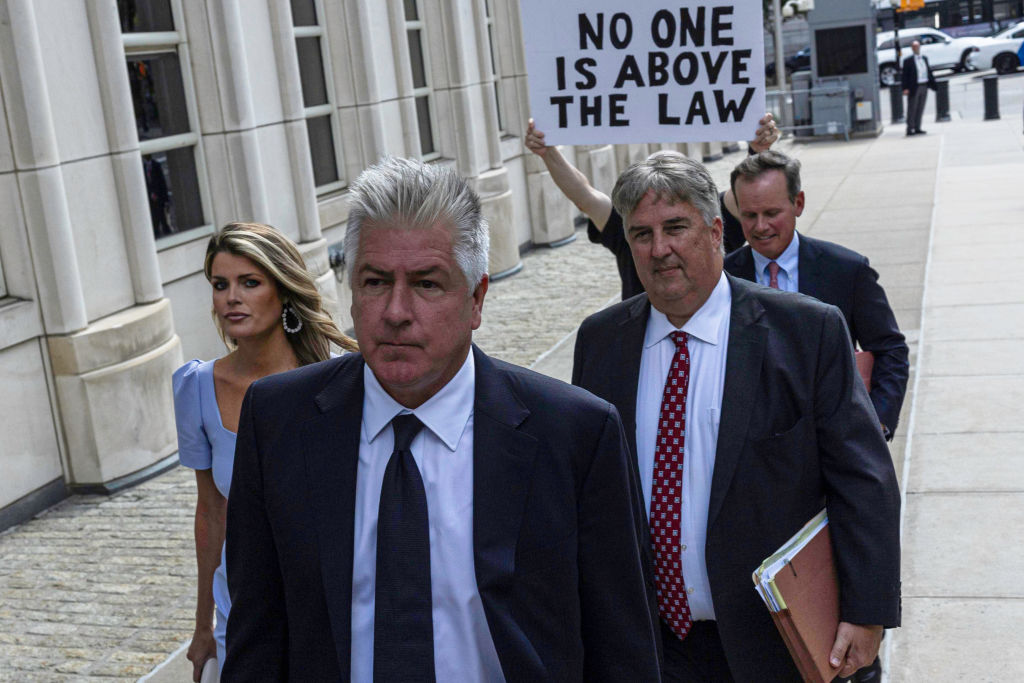
During a Tuesday court hearing, an independent judge tasked with reviewing the thousands of documents seized from former President Donald Trump’s residence in Palm Beach, Florida, pressed Trump’s legal team on whether they would provide evidence that Trump declassified any of the materials.
Trump has claimed publicly that he declassified the government records that were taken from Mar-a-Lago. Trump’s legal team has not made such an argument in ongoing litigation surrounding access to the documents, and in court filings on Monday his team said they opposed having to shortly disclose “specific information regarding declassification,” as the Justice Department (DOJ) had requested, and instead proposed timing closer to early November.
During his first public hearing as a special master on Tuesday, Judge Raymond Dearie said that if the government provided him with evidence that there were classified documents taken from Mar-a-Lago, and Trump’s side doesn’t advance “any claim of declassification,” as far as he’s concerned “that’s the end of it” and he’ll believe the materials were classified.
Dearie has been assigned to review all of the materials taken by the FBI in its August search of Mar-a-Lago—including roughly 100 documents containing classification markings—and make recommendations on which should be kept from the Justice Department on the grounds of attorney-client or executive privilege. During Tuesday’s hearing in Dearie’s Brooklyn courtroom, it appeared the judge might not be as sympathetic to Trump’s legal arguments as his team might have hoped when they recommended him for the position. (Trump’s legal team did not respond to TIME’s request for comment, and DOJ declined to comment.)
Read More: Who is Raymond Dearie, the Special Master Reviewing the Mar-a-Lago Documents?
Trump’s attorney Jim Trusty responded that they were not in a position to discuss declassification until they saw the documents in question, and added that they could not fully disclose their defense, per CNN. In a separate filing on Tuesday, Trump’s team also argued that the federal government has failed to provide any evidence that the documents in question are classified, adding that “the president has broad authority governing classification of, and access to, classified documents.”
Whether the roughly 100 documents with classification markings taken from Mar-a-Lago actually are classified sits at the heart of the Justice Department’s investigation, which is probing whether Trump broke federal law by removing the materials from the White House. In an interview with Breitbart News in May, former top Trump aide Kash Patel said he had witnessed Trump declassify documents that the National Archives and Records Administration (NARA) said were identified as “classified national security information” that were shipped to Mar-a-Lago. (NARA’s tip about the materials launched the current DOJ investigation and subsequent FBI search.)
“The White House counsel failed to generate the paperwork to change the classification markings, but that doesn’t mean the information wasn’t declassified,” Patel told Breitbart. Trump affirmed Patel’s account on September 15 on Hugh Hewitt’s radio show. But some experts are skeptical he could declassify such documents, including documents marked “Top Secret,” so easily; under a typical declassification process, Trump would notify the agencies and departments that dealt with the information in question and change the classification markings on the documents.
“Ordinarily, an authorized U.S. Government official with original classification authority can declassify a document through the process of crossing out the classification markings and stamping the document as declassified, including identifying who declassified, when, and upon what authority,” explains Bradley P. Moss, a lawyer specializing in national-security issues. Until that process is complete, Moss says, those classification markings are valid.
Presidents do have significant authority over classified information, which has been reaffirmed through a series of executive orders over the decades. The most recent order, issued by then-President Barack Obama in 2009, directs the classification and subsequent declassification process to be handled by the heads of the agencies and departments that classified the information. As the New York Times reported, the U.S. Court of Appeals for the Second Circuit ruled in 2020 that “declassification, even by the President, must follow established procedures.”
“It is entirely possible Mr. Trump issued verbal orders to declassify and did not properly notify the rest of the government,” Moss says. “That would be insanely reckless, and yet completely typical for someone like Mr. Trump who cared not at all about those kinds of details.”
That could bring the investigation into uncharted legal territory: there is no Supreme Court court ruling on what it might mean if a President broke from normal declassification procedures. It remains to be seen whether Trump’s team will argue before Dearie that the former President declassified the materials while in office.
More Must-Reads From TIME
- The 100 Most Influential People of 2024
- Coco Gauff Is Playing for Herself Now
- Scenes From Pro-Palestinian Encampments Across U.S. Universities
- 6 Compliments That Land Every Time
- If You're Dating Right Now , You're Brave: Column
- The AI That Could Heal a Divided Internet
- Fallout Is a Brilliant Model for the Future of Video Game Adaptations
- Want Weekly Recs on What to Watch, Read, and More? Sign Up for Worth Your Time
Write to Madeleine Carlisle at madeleine.carlisle@time.com